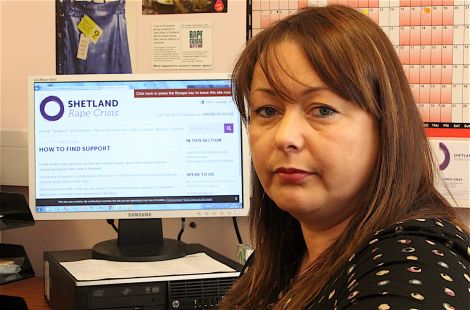News / Rape crisis service hopeful way can be found to forensically test assault victims locally
THE LOCAL branch of Rape Crisis Scotland (RCS) is confident that a solution will be found so that people who have been raped or sexually assaulted no longer have to travel to the mainland for forensic examinations.
A meeting is due to take place between NHS Shetland, the police, Shetland Rape Crisis and others on Tuesday with the aim of finding a way of providing the crucial forensic tests locally.
RCS national coordinator Sandy Brindley has strongly criticised a setup where rape survivors in Shetland and Orkney travel to the mainland and are advised not to wash, eat or drink before being examined in case evidence is lost.
Survivors are escorted by police on a flight or ferry to Aberdeen, and Brindley says it is “a completely unacceptable situation – often, the first thing people want to do after being raped is wash, and the length of delay of having to travel without being able to wash can make an already traumatic situation worse”.
The police previously bought in forensics from the NHS, but in 2014 the budget was transferred to the health service. RCS says that, despite the introduction of minimum standards for providing forensic examinations after sexual offences, its implementation “is still patchy across the country”.
Linda Gray of Shetland Rape Crisis, which was set up six months ago, said she had worked with numerous people who said the prospect of travelling to Aberdeen for tests was one of two key barriers that prevented them from contacting the police after being sexually assaulted.
The other issue – more difficult to address – is “complex family dynamics and the remote rural setting”, with survivors more likely to bump into the perpetrator.
But she believes the need to travel for tests worsens a situation that, despite a relatively high detection rate, saw only three rapes and 12 sexual assaults recorded by police in Shetland in 2014/15. “That’s probably just the tip of the iceberg,” Gray said.
Become a member of Shetland News
In addition to discomfort at the prospect of travelling while in a highly vulnerable state, some folk “had misinformation that in order to do forensic testing they had to go straight away or within 24 hours – but there can be forensic capture for up to seven days depending on where that is taken from”.
“Although the quality of the forensic capture can lessen, it can still be retrieved, so I guess that allows folk more time to think about what they want to do,” Gray continued.
“Forensic capture is such an important part of the corroboration for conviction, because there’s hardly ever any witnesses. It can make such a difference for it going to court.”
In some cases the alleged perpetrator, as well as the victim of the crime, is tested and “you wouldn’t want them both going south on the same plane or anything like that”.
Gray said the Western Isles was able to provide forensic testing without patients having to leave, and she feels progress has been made in persuading NHS Shetland that “if the Western Isles can do it, we can do it”.
It will require a highly trained physician and a room cleaned to a standard ensuring there is no cross-contamination of samples, but health board representatives have met with the Western Isles GP who provides forensic testing and “they’ve learned it’s not as complicated as they first thought”.
If it is possible to provide the service in the hospital, there would be the added benefit that people could “also get any medical intervention that was needed straight after – the morning-after pill etc. – so it could be a one-stop shop”.
Survivors have also provided feedback indicating they find having a male examiner difficult, and Gray said that enabling nurse practitioners to carry out examinations would help alleviate that problem.
Shetland MSP Tavish Scott has given his backing to rape crisis workers seeking a different approach.
“We need to make sure that women who are subject to sexual assault, or even worse are a rape survivor, do get the attention they need and quickly in Shetland without having the indignity and worry of having to get on a plane to Aberdeen,” he said.
“So I hope the public agencies will now work towards that objective and provide Shetland with forensic services that are very much needed.”
Become a member of Shetland News
Shetland News is asking its readers to consider paying for membership to get additional perks:
- Removal of third-party ads;
- Bookmark posts to read later;
- Exclusive curated weekly newsletter;
- Hide membership messages;
- Comments open for discussion.
If you appreciate what we do and feel strongly about impartial local journalism, then please become a member of Shetland News by either making a single payment, or setting up a monthly, quarterly or yearly subscription.




























































